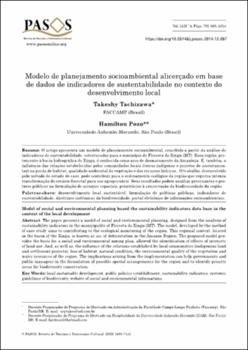Modelo de planejamento socioambiental alicerçado em base de dados de indicadores de sustentabilidade no contexto do desenvolvimento local
Fecha
2014Resumen
O artigo apresenta um modelo de planejamento socioambiental, concebido a partir da análise de
indicadores de sustentabilidade, estruturados para o município de Floresta do Xingu (MT). Essa região, pertencente à bacia hidrográfica do Xingu, é conhecida como arco de desmatamento da Amazônia. E, também, a
influência das relações estabelecidas pelas comunidades locais (terras indígenas e projetos de assentamentos) na perda de habitat, qualidade ambiental da vegetação e dos recursos hídricos.. O trabalho, desenvolvido
pelo método de estudo de caso, pode contribuir para o ordenamento ecológico da região que registra intensa
transformação do cenário florestal para uso agropecuário. Seus resultados podem auxiliar governantes e gestores públicos na formulação de arranjos espaciais, prioritários à conservação da biodiversidade da região The paper presents a model of social and environmental planning, designed from the analysis of
sustainability indicators in the municipality of Floresta do Xingu (MT). The model, developed by the method
of case study aims to contributing to the ecological monitoring of the region. This regional context, located
in the basin of the Xingu, is known as arc of deforestation in the Amazon Region. The proposed model provides the basis for a social and environmental zoning plan, allowed the identification of effects of intensity
of land use. And, as well as, the influence of the relations established by local communities (indigenous land
and settlement projects), loss of habitat, natural condition, the environmental quality of the vegetation and
water resources of the region. The implications arising from the implementation can help governments and
public managers in the formulation of possible spatial arrangements for the region and to identify priority
areas for biodiversity conservation.





